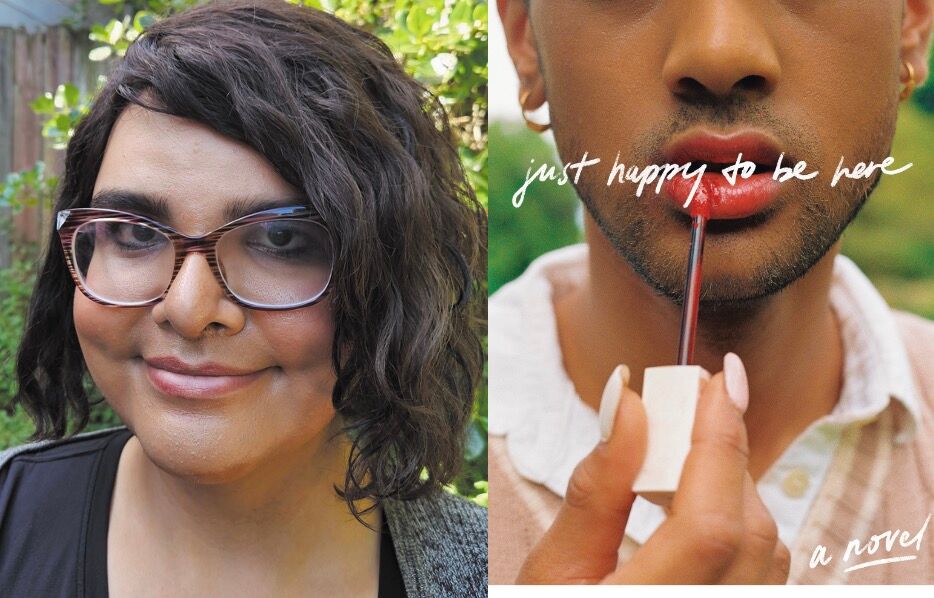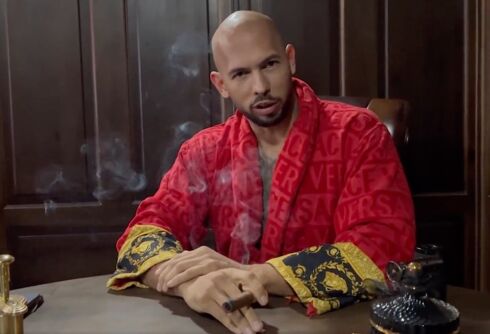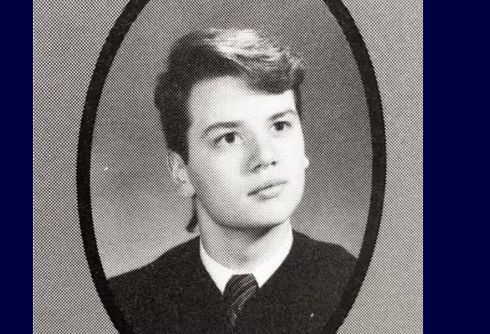Tara is a transgender teen with no access to gender-affirming care. She desperately wants to fit in at the all-girls high school she attends in Virginia, but it’s not easy when she knows how much she physically stands out. So begins Naomi Kanakia’s Just Happy to Be Here, a young adult (YA) novel about surviving girlhood amidst the backdrop of endless political attacks on one’s very existence.
Tara is not interested in being an activist or spokesperson for the trans community. She just wants to make friends, feel “normal,” whatever that means, and gain admittance to an exclusive club where she feels like she has found her place.
Related:
“Gender Queer” author Maia Kobabe wants to help you build a better relationship with binding
Because being trans should not mean being in pain.
But when it becomes clear that Tara’s admission into the club is not guaranteed, many of the students believe transphobia is to blame. However, not even Tara is sure about that. Nevertheless, she feels pressure to stand up and fight when all she really wants to do is fade into the background and keep working on convincing her parents she needs gender-affirming care as soon as possible. As much as she doesn’t want to be discriminated against, she doesn’t want people to think she deserves any special treatment due to her identity, either.
Never Miss a Beat
Subscribe to our newsletter to stay ahead of the latest LGBTQ+ political news and insights.
More than anything, Just Happy To Be Here is about a girl who desperately wants to be seen for who she is and not for her transness. Kanakia spoke with LGBTQ Nation about crafting the story in today’s turbulent political climate and the immense responsibility she feels to ensure the novel has a positive impact on trans readers.
LGBTQ NATION: You were writing this book at the same time state legislatures were debating and passing gender-affirming care bans. What was it like to work on the story as the events it’s based on were still unfolding?
NAOMI KANAKIA: When I pitched the book in 2021, trans issues were not national issues. They were not things that presidential candidates cared about or that governors ran on. There were definitely intimations that that was going to be a pivot by Republican operatives, but it was not on my radar, and I don’t think it was on very many people’s radars. So when I wrote the first draft of the book in 2021, it didn’t really have any of that stuff.
And then the very first gender-affirming care ban [became law on April 6, 2021 in Arkansas]. As I was doing my revisions, I just started putting some of this stuff in. I had the book coming out in a reasonable amount of time [and knew I] should have something in there to document how this is suddenly a national issue. It just really kept getting worse.
I think I wrote in my author’s note that there were 10 states that had gender-affirming care bans for teens, and now it has risen to more than 20. At the time, it felt pretty surreal; it still feels kind of surreal. Because being trans, it’s really not that interesting. It’s very interesting for the person who goes through it, but to add this whole element where you’re suddenly a public enemy is very strange.
During the same period of time I wrote the book I read Anne Frank’s diary, and I think the thing that has always struck people about it is that like 90% of what she writes about is like, she has a crush on Peter and she gets annoyed at her mom. It’s just very regular stuff, but then against the backdrop of such an extraordinary situation, it’s difficult for her to understand.
Let’s talk about the dynamic between Tara, a trans girl, and Liam, a trans boy, both attending the all-girls school. The characters are foils of each other, with Liam’s desire to be loud about activism and injustice, and Tara just wanting to blend in and live her life. Why did you decide to create both kinds of characters?
Most trans people, or at least most trans people I know, are very political. Tara’s a bit of an outlier in that she is assimilationist.
I personally am very assimilationist. I have not succeeded and probably will not succeed, but I would love if, like, you know, I passed. I live in San Francisco and have a house. I’m on the PTA at my kid’s school. I am not, like, radical. I just want to kind of slide in there. So I definitely have to be cognizant that we’re a coalition with lots of people who have different needs. For someone like me, medical transition is really, really important. For trans women and trans girls, there’s a lot of contact with the medical system. For genderqueer and nonbinary people, that’s not really part of being trans for them. For me psychologically and for Tara psychologically, being trans is not really a form of self-expression. She really wants to fit in.
I think there’s also a tendency for people who have those ideals, like me, to throw other people under the bus. I mean, the fact is I’ve benefited a lot from like, the acceptance of visibly gender nonconforming people.
Twenty years ago there was no bathroom debate because people like me just never used the bathroom. Ever. We would never go into a public bathroom. Now I can. I’m not sure I necessarily have a takeaway on what’s the right way to be. I just felt that Tara was a certain way.
I’m always terrible at gaming the YA readership. At some point, they really didn’t like issues novels. They only wanted books about queer joy. I feel like Tara is really trying to have queer joy. She’s not out there trying to stir up trouble. But then people get mad because she’s ignoring so much trouble or because she faces so much transphobia that [she tries to ignore]. I do think people have a bit of unrealistic expectations, especially people who are not trans girls or women, of what our life entails. There are very few trans girls and women who are not facing any transphobia. To have some kind of queer joy, you just have to be strong and learn to overlook a lot.
In an essay you wrote, you said, “If I thought even one teenager would be harmed by my work, I wouldn’t write it.” That’s a lot of responsibility. How do you think about that while you’re writing?
When I was younger, I would be so affected by gay civil rights victories. I remember when Elliot Page… came out as a lesbian. Me and my boyfriend at the time, we were crying. Growing up, there weren’t even gay movies. There weren’t even gay celebrities. There weren’t gay singers other than Elton John.
I definitely remember that feeling of the world opening up and things getting better. But they didn’t get as much better as I would have thought. I don’t want someone to read my book and suddenly get really hyped up and tell everyone they’re trans and then it turns ugly. I don’t want my work to make someone come out in a dangerous spot for them. That’s really terrifying. I can’t be there with them. I can’t help them. I can’t do anything for them.
So it’s very frightening. I would love for someone to read my book and be like, yeah, I’m trans. This is great. This is right for me. But then I immediately also want them to be afraid, you know? But on the other hand, I really don’t want them to be too afraid. Because I definitely don’t want them to read my book and feel like, oh yeah, life is terrible for trans people, I’m just gonna kill myself. It’s not a responsibility I ever felt before writing this book. Because there are not really a lot of portrayals of trans girls in books for teens.
In places like Virginia, where the story takes place, it’s getting harder to get books like this into the hands of students who might really need them. What would you say to a school board or parent who doesn’t believe kids should have access to books like this?
They don’t believe that being trans is real; there’s nothing you can say to them. They think it’s a conspiracy, that it’s a notion that has been transmitted to kids. I mean, there’s no convincing them. If I also believed there was some sort of dangerous social contagion that had no basis in life science and if people caught it they would have no chance of having a happy life and they would just be monsters who physically mutilate themselves, then yeah, I would also be against having access to those.
It’s hard because these are questions of fact, and you’re just not right on the fact. I do think schools and libraries should have the right to buy only the books that they think are worthwhile to buy. I do think it is a little bit cliche to be so worried about ideas in books. I mean, all the kids have the Internet; they’re all on TikTok. These book bans are not to restrict information. They know the kids are going to learn about being trans. It’s basically just to bully and terrorize kids, to signal you’re not welcome here in this library or in this school.
It’s the same with these bathroom bans. Utah just passed one. Could I go to Utah and just not go to bathrooms in the airport and not visit government buildings and just look for gender-neutral bathrooms? Yeah, logistically I could probably avoid violating the law, but the law is laid out as a statement that trans people are not welcome in this state.
What do you most hope trans teens get out of the book?
I want them to understand that even though transitioning is hard and can be really slow, that if you’re trans, it can still feel really right. Most trans teens in America are not medically transitioning, and most people who medically transition will not transition as teenagers. Most trans teens are socially transitioning. I wanted to show someone who socially transitioned. There’s a lot of value in that. I wanted them to see what it’s like and just see that there’s a lot of good there.
If you or someone you know is struggling or in crisis, help is available. Call or text 988 or chat at 988lifeline.org. The Trans Lifeline (1-877-565-8860) is staffed by trans people and will not contact law enforcement. The Trevor Project provides a safe, judgement-free place to talk for youth via chat, text (678-678), or phone (1-866-488-7386). Help is available at all three resources in English and Spanish.

















